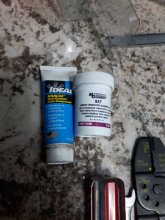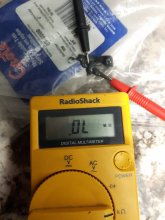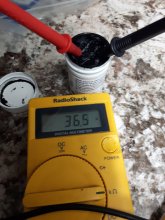Your apparently unaware of the fact that carbon is what the brushes in electric motors are made of.I do know that cheap resistors are made out of carbon, it's not a particularly good conductor.
You are using an out of date browser. It may not display this or other websites correctly.
You should upgrade or use an alternative browser.
You should upgrade or use an alternative browser.
[PSA] Make sure to properly prepare your connections to aluminium terminal posts in order to ensure low contact resistance.
- Thread starter VagueDirector
- Start date
I'm aware of the fact that brushes for my 1969 vw generator are made out of carbon for it's resistance to arcing (a byproduct of increased resistance). Not because they have lower conductivity.Your apparently unaware of the fact that carbon is what the brushes in electric motors are made of.
You don't really get the point. The objective is to exclude air and water and thus corrosion. Neither is a particularly good conductor as you demonstrate. Certainly I would not wish either infinite resistance nor 36 ohms resistance, I want metal to metal contact without corrosion.Noalox vs MG carbon conductive assembly paste:
View attachment 37443
View attachment 37444
View attachment 37445
One of us certainly is missing the point.You don't really get the point. The objective is to exclude air and water and thus corrosion. Neither is a particularly good conductor as you demonstrate. Certainly I would not wish either infinite resistance nor 36 ohms resistance, I want metal to metal contact without corrosion.
Last try.
In a perfect world, you would have absolutely flat, perfectly mating contact surfaces with no oxide or corrosion.
In the real world, no surfaces are absolutely flat therefor you have the possibility of both water and air entering the connection and oxidizing the surfaces and providing an electrolyte for corrosion. Both of these products prevent that.
Because of the non flat surface on both sides of the connection, there is only a relatively small area of high pressure contact area between the two sides of the connection, especially after someone has gone after the surfaces with a wire wheel on a dremel, sand paper with no rigid backing block or any other far from perfect world way of removing oxides from the surface. It is those voids that the corrosion inhibitor paste is needed to fill but it is also those voids filled with corrosion inhibitor which are non conductive, unless of course it is filled with a conductive corrosion inhibitor.
Filling these voids with a conductive material restores a portion of that lost conductivity, It is carbon, so its not as good as it would be if the surfaces were perfect, no-one ever attempted to claim that. What it is, is better than a non-conductive atmospheric exclude like noalox.
Yes the resistance is high from a conductor stand point. The probes are stuck in a jar and are about 1cm apart. The voids in the connection are a little shorter than that.
Last edited:
Hedges
I See Electromagnetic Fields!
- Joined
- Mar 28, 2020
- Messages
- 21,895
It appears carbon serves as a cathode that accelerates corrosion of aluminum.
I don't find on MG's site any recommendations for or against use of their product with aluminum.
The paste contains carbon, but also grease to seal the connection.
I think we need environmental test results to indicate if it is compatible.
 digitalcommons.du.edu
digitalcommons.du.edu
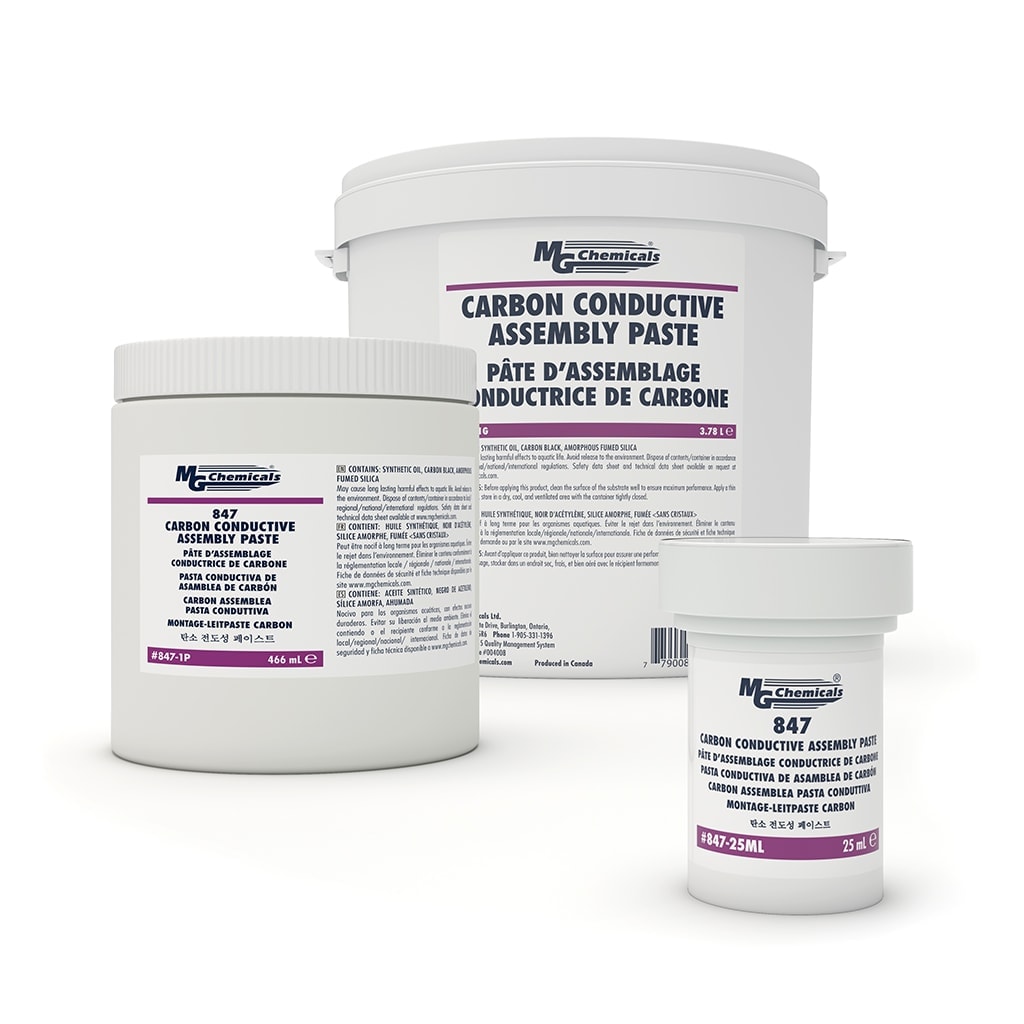
 www.mgchemicals.com
www.mgchemicals.com
I don't find on MG's site any recommendations for or against use of their product with aluminum.
The paste contains carbon, but also grease to seal the connection.
I think we need environmental test results to indicate if it is compatible.
Galvanic Corrosion of Aluminum/Carbon Composite Systems
Aluminum/carbon composite systems can have outstanding mechanical properties. Aluminum and carbon fiber reinforced polymer matrix composites (CFRP) are typically considered corrosion resistant when used alone, but can develop severe galvanic corrosion when in physical contact in the same...

847 - Carbon Conductive Assembly Paste
Resistivity of 23 Ω.cm Improves electrical connections between irregular, pitted or corroded surfaces Ensures electrical contact between loose or vibrating parts Prevents arching, pitting, hotspots and welds Inhibits corrosion Fills gaps Can be used on vertical surfaces Silicone-free
It appears carbon serves as a cathode that accelerates corrosion of aluminum.
I don't find on MG's site any recommendations for or against use of their product with aluminum.
The paste contains carbon, but also grease to seal the connection.
I think we need environmental test results to indicate if it is compatible.
Galvanic Corrosion of Aluminum/Carbon Composite Systems
Aluminum/carbon composite systems can have outstanding mechanical properties. Aluminum and carbon fiber reinforced polymer matrix composites (CFRP) are typically considered corrosion resistant when used alone, but can develop severe galvanic corrosion when in physical contact in the same...digitalcommons.du.edu

847 - Carbon Conductive Assembly Paste
Resistivity of 23 Ω.cm Improves electrical connections between irregular, pitted or corroded surfaces Ensures electrical contact between loose or vibrating parts Prevents arching, pitting, hotspots and welds Inhibits corrosion Fills gaps Can be used on vertical surfaces Silicone-freewww.mgchemicals.com
It does. I mentioned that above.
I have had 2 emails with their tech support and they confirmed to me that it was suitable for use with aluminum and as the grease excludes atmosphere from contact with the carbon, it is prevented from becoming a cathode.
I did not ask for environmental test results. I'll fire off an email to them tomorrow.
FilterGuy
Solar Engineering Consultant - EG4 and Consumers
I should know better than to get in the middle of a cat fight..... but what the heck!!.
I think everyone would agree that No-lox is at least good enough. The question is whether the Carbon Conductive grease is better.
That has to be evaluated several ways.
 )
)
So..... let me throw a bit more on the fire. If we are looking for conductive grease (and price is not an issue) lets go for a grease with Volume Resistivity of <0.01 ohm-cm
However, for the same reasons as the carbon grease, I don't know if it would be functionally better or not.
I think everyone would agree that No-lox is at least good enough. The question is whether the Carbon Conductive grease is better.
That has to be evaluated several ways.
- Which is lower cost.
I don't think anyone is debating this, the Noalox is lower cost) - Which provides the best protection from oxidation? (this must include long term protection...... can one dry out?)
Since the reason for putting anything on the terminals is to prevent oxidation....if it does not do this then it is not an acceptable choice.
I am willing to assume the Conductive grease is good enough..... so let's call this a draw. - Are there bad side effects of either.
Does it negatively interact with the aluminum? We don't know, but if it keeps out oxygen, it probably is not a problem.
Does it create shorts? (conductive grease would if you are messy with it, but if you are careless there are lots of ways to create shorts)
I am willing to call this a draw but it would be good to know if the galvanic corrosion can occur - Which provides the best electrical connection?
This is the big question. At first blush, I would think the conductive grease would be better. However.... there is a possibility it makes a worse connection. The way noalox works is that it is squeezed out an does not inhibit the faces of the lug and terminal from making a strong electrical connection. Does the carbon based grease adequately squeeze out? I don't know..... I think this is dependent on the size of the carbon dust that is used in the product. If a thin layer of carbon dust keeps the two surfaces from mating, it could actually create a much higher resistance connection. In the examples from the manufacturer it is all contacts that are sliding over each other so we can't safely assume a press connection would work well with the product.
Without more data I have to call this an unknown.
So..... let me throw a bit more on the fire. If we are looking for conductive grease (and price is not an issue) lets go for a grease with Volume Resistivity of <0.01 ohm-cm
Amazon.com: Chemtronics CW7100 CircuitWorks Silver Conductive Grease : Tools & Home Improvement
Buy Chemtronics CW7100 CircuitWorks Silver Conductive Grease: Welding Equipment & Accessories - Amazon.com ✓ FREE DELIVERY possible on eligible purchases
www.amazon.com
Last edited:
You beat me to it. I was getting ready to post this stuff.However, for the same reasons as the carbon grease, I don't know if it would be functionally better or not.
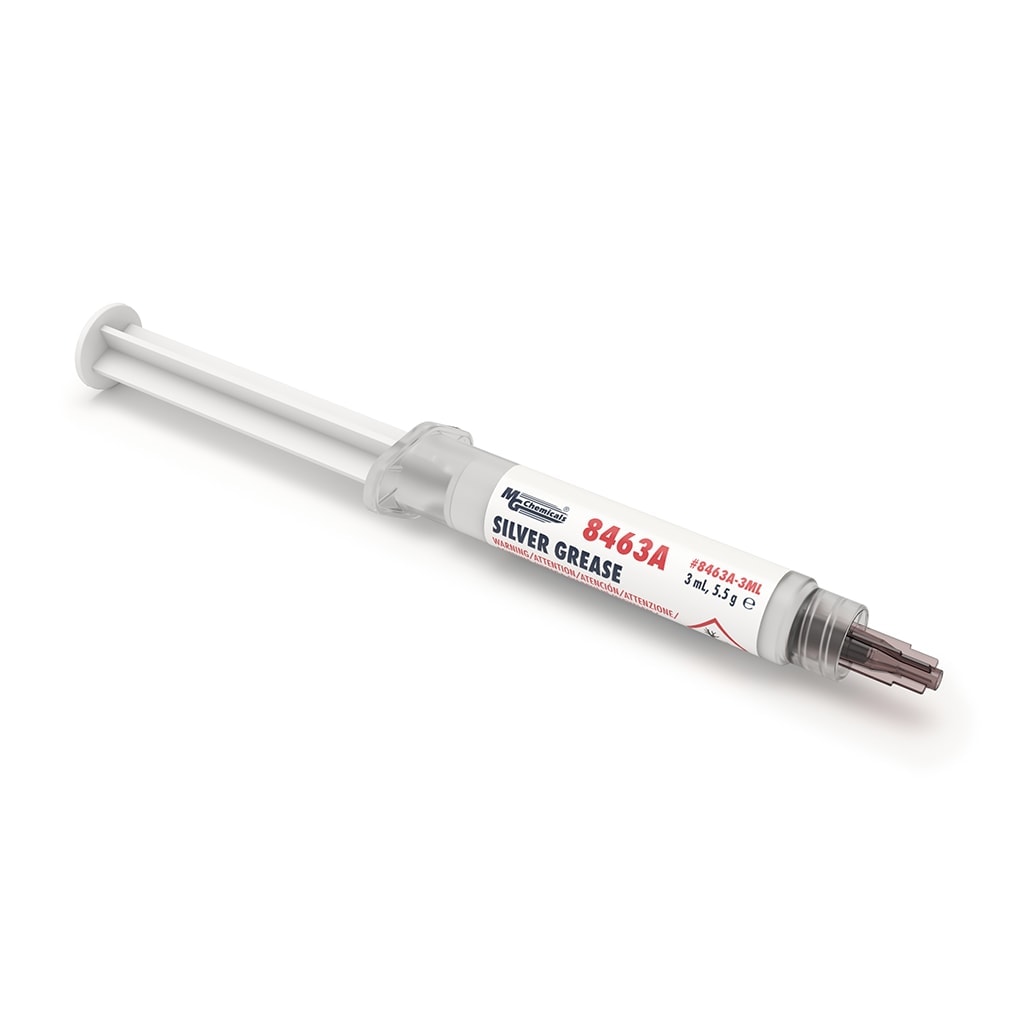
8463A - Silver Grease
8463A is a highly conductive electrical lubricant that uses a silicone-based oil and specially formulated silver-coated aluminum flake
I don't know if Chemtronics is better than MG Chemicals. But I would think either one is better than using carbon grease. Isn't silver the best conductor?
FilterGuy
Solar Engineering Consultant - EG4 and Consumers
It is a reasonably good assumption that the silver grease is better than the carbon grease for making an electrical connection.....but since both of these are a grease with a dust mixed in.... I keep going back to the question of whether it can squeeze out enough.You beat me to it. I was getting ready to post this stuff.

8463A - Silver Grease
8463A is a highly conductive electrical lubricant that uses a silicone-based oil and specially formulated silver-coated aluminum flakewww.mgchemicals.com
I don't know if Chemtronics is better than MG Chemicals. But I would think either one is better than using carbon grease. Isn't silver the best conductor?
The other thing to keep in mind is that Noalox is good enough and good enough is.... good enough.
Hedges
I See Electromagnetic Fields!
- Joined
- Mar 28, 2020
- Messages
- 21,895
I havent put any grease on my bats because i dont have enough info to make a decision!.. hope the fight brings something!
Bare aluminum?
Read the various threads, and you'll have enough info to put something on it.
I'm not sure where it rates, but silver plated copper is surprisingly cheap.You beat me to it. I was getting ready to post this stuff.

8463A - Silver Grease
8463A is a highly conductive electrical lubricant that uses a silicone-based oil and specially formulated silver-coated aluminum flakewww.mgchemicals.com
I don't know if Chemtronics is better than MG Chemicals. But I would think either one is better than using carbon grease. Isn't silver the best conductor?
I think gold is maybe better. Depends on the application, gold plated connectors.
McMaster-Carr
McMaster-Carr is the complete source for your plant with over 595,000 products. 98% of products ordered ship from stock and deliver same or next day.
FilterGuy
Solar Engineering Consultant - EG4 and Consumers
If you use silver plated copper, be sure to also use a grease to seal it. Silver oxide is an insulator. Copper Oxide is not.I'm not sure where it rates, but silver plated copper is surprisingly cheap.
I think gold is maybe better. Depends on the application, gold plated connectors.

McMaster-Carr
McMaster-Carr is the complete source for your plant with over 595,000 products. 98% of products ordered ship from stock and deliver same or next day.www.mcmaster.com
I should know better than to get in the middle of a cat fight..... but what the heck!!.
I think everyone would agree that No-lox is at least good enough. The question is whether the Carbon Conductive grease is better.
That has to be evaluated several ways.
After careful analysis, the answer is that I don't know which is better functionally. I would have to do some experiments to test the two and see if there is a detectable difference. (How is that for saying a lot of nothing?
- Which is lower cost.
I don't think anyone is debating this, the Noalox is lower cost)- Which provides the best protection from oxidation? (this must include long term protection...... can one dry out?)
Since the reason for putting anything on the terminals is to prevent oxidation....if it does not do this then it is not an acceptable choice.
I am willing to assume the Conductive grease is good enough..... so let's call this a draw.- Are there bad side effects of either.
Does it negatively interact with the aluminum? We don't know, but if it keeps out oxygen, it probably is not a problem.
Does it create shorts? (conductive grease would if you are messy with it, but if you are careless there are lots of ways to create shorts)
I am willing to call this a draw but it would be good to know if the galvanic corrosion can occur- Which provides the best electrical connection?
This is the big question. At first blush, I would think the conductive grease would be better. However.... there is a possibility it makes a worse connection. The way noalox works is that it is squeezed out an does not inhibit the faces of the lug and terminal from making a strong electrical connection. Does the carbon based grease adequately squeeze out? I don't know..... I think this is dependent on the size of the carbon dust that is used in the product. If a thin layer of carbon dust keeps the two surfaces from mating, it could actually create a much higher resistance connection. In the examples from the manufacturer it is all contacts that are sliding over each other so we can't safely assume a press connection would work well with the product.
Without more data I have to call this an unknown.)
So..... let me throw a bit more on the fire. If we are looking for conductive grease (and price is not an issue) lets go for a grease with Volume Resistivity of <0.01 ohm-cm
However, for the same reasons as the carbon grease, I don't know if it would be functionally better or not.Amazon.com: Chemtronics CW7100 CircuitWorks Silver Conductive Grease : Tools & Home Improvement
Buy Chemtronics CW7100 CircuitWorks Silver Conductive Grease: Welding Equipment & Accessories - Amazon.com ✓ FREE DELIVERY possible on eligible purchaseswww.amazon.com
You beat me to it. I was getting ready to post this stuff.

8463A - Silver Grease
8463A is a highly conductive electrical lubricant that uses a silicone-based oil and specially formulated silver-coated aluminum flakewww.mgchemicals.com
I don't know if Chemtronics is better than MG Chemicals. But I would think either one is better than using carbon grease. Isn't silver the best conductor?
YES!
In my opinion this is a huge win for everyone. I found silver epoxies and paints but hadnt stumbles across assembly paste and didnt think to search directly for it. I had searched in every way I could think of and only found carbon paste.
I would have used noalox if carbon paste wasnt an opton, Now what I know silver paste is a thing, Ill be using that!
FilterGuy, That was way more than a lot of nothing! Contemplative and reasonable discussion is an amazing skill. There are so few people in the world that are willing to let their thoughts out into the wild and just allow them to live or die. Most are just worried about being right. Personally, I dont care about being right, I just want to get to (what I believe) is a better place and you ( Gazoo was going to too) helped me and others do that. Thank you!
Edit: Just added it to the Digi-key cart. Not cheap at $60CAD but after spending over $6K on a batteries, inverter/charger and all the other miscellaneous pieces there isnt much point in cheaping out at this point
Last edited:
I did forget to mention that in the TDS the list of suggested applications for the carbon paste specifically stated battery terminal and bus bar suggested applications.In the examples from the manufacturer it is all contacts that are sliding over each other so we can't safely assume a press connection would work well with the product.
"Use 847 when you want a non-bleeding paste that provides great electrical contact and environmental protection. It is excellent for use on ground connections, battery terminals, bus bars, single pole jacks, slide connectors, HVAC connections, speaker posts, and fluorescent light pins."
FYI, I emailed MG and got this reply regarding their silver grease:
"While we do have a silver conductive grease, it actually wasn’t formulated very well and does not have very good electrical conductivity so I would still suggest the 847. We are currently formulating a silver grease but it is likely several months away from going to market."
I guess its coming out of my cart.....
"While we do have a silver conductive grease, it actually wasn’t formulated very well and does not have very good electrical conductivity so I would still suggest the 847. We are currently formulating a silver grease but it is likely several months away from going to market."
I guess its coming out of my cart.....
mrdavvv
Solar Enthusiast
- Joined
- Jan 14, 2020
- Messages
- 406
What are you using if i can know @Hedges =?.Bare aluminum?
Read the various threads, and you'll have enough info to put something on it.
I found both No-ox and the carbon stuff perfectly reasonable, sliding a little bit to the carbon side but still not sure. Maybe ill measure conductivity in a test setup.
Hedges
I See Electromagnetic Fields!
- Joined
- Mar 28, 2020
- Messages
- 21,895
What are you using if i can know @Hedges =?.
I found both No-ox and the carbon stuff perfectly reasonable, sliding a little bit to the carbon side but still not sure. Maybe ill measure conductivity in a test setup.
Copper on copper, or copper on tin-plated aluminum. I don't have anything with bare aluminum electrical parts. I'm also not in a particularly corrosive environment.
I know my QO breakers come with some grease, not loaded with any particles.
I did get some copper particle grease years ago, and recently tried that in some plated crimp terminals on unplated copper, making battery cables.
I probably have some no-ox or similar. I did have to splice to an aluminum wire a while ago, using Cu-Al terminals.
I have had some seized aluminum set screws so I should start using something on any such threads.
Gold is the best..You beat me to it. I was getting ready to post this stuff.

8463A - Silver Grease
8463A is a highly conductive electrical lubricant that uses a silicone-based oil and specially formulated silver-coated aluminum flakewww.mgchemicals.com
I don't know if Chemtronics is better than MG Chemicals. But I would think either one is better than using carbon grease. Isn't silver the best conductor?
LOL. Im not going to pay what it would take to get gold conductive paste!Gold is the best..
Well, someone asked what's best and I answered, gold is best, which is why high end audio and video cables are plated gold.LOL. Im not going to pay what it would take to get gold conductive paste!
No...silver is best, followed by copper then gold. Maybe the high end audio stuff uses gold to prevent corrosion. I really don't know.Well, someone asked what's best and I answered, gold is best, which is why high end audio and video cables are plated gold.
:max_bytes(150000):strip_icc()/the-most-conductive-element-606683_FINAL-cb8d31a0404241e2a3187e67c7b57e8c.gif)
Which Element Is the Best Conductor of Electricity?
Learn about the different definitions of conductivity in science and which elements are the best conductors.
I thought loud oxygen free copper was the best:
Yes, I’m kidding. I think the marketing department gets involved sometimes ?
Yes, I’m kidding. I think the marketing department gets involved sometimes ?
Similar threads
- Replies
- 11
- Views
- 493
- Replies
- 13
- Views
- 1K
- Replies
- 7
- Views
- 259
- Replies
- 7
- Views
- 899



